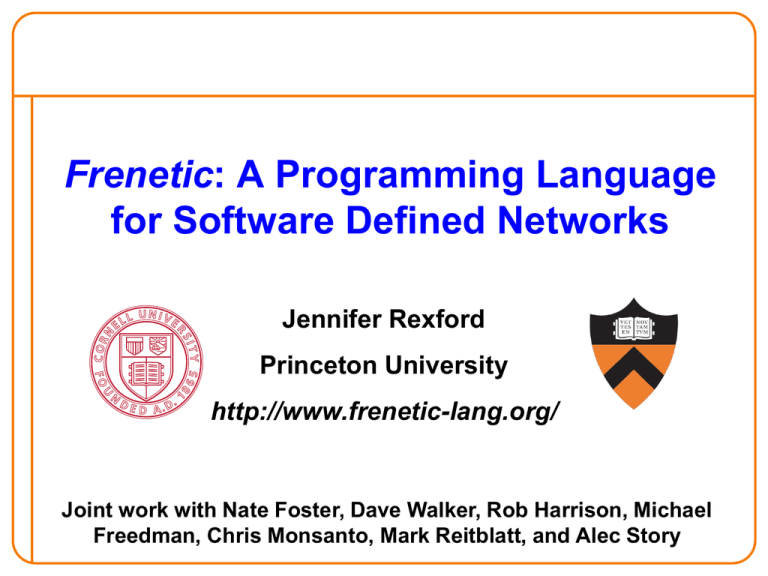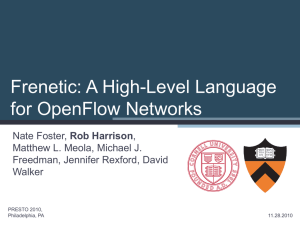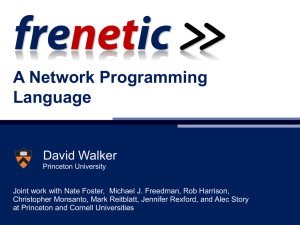Frenetic: A Programming Language for Software Defined
advertisement

Frenetic: A Programming Language
for Software Defined Networks
Jennifer Rexford
Princeton University
http://www.frenetic-lang.org/
Joint work with Nate Foster, Dave Walker, Rob Harrison, Michael
Freedman, Chris Monsanto, Mark Reitblatt, and Alec Story
Network Programming is Hard
• Programming network equipment is hard
–Complex software by equipment vendors
–Complex configuration by network administrators
• Expensive and error prone
–Network outages and security vulnerabilities
–Slow introduction of new features
• SDN gives us a chance to get this right!
–Rethink abstractions for network programming
2
Programming Software Defined Networks
• OpenFlow already helps a lot
– Network-wide view at controller
– Direct control over data plane
Controller
• The APIs do not make it easy
– Limited controller visibility
– No support for composition
– Asynchronous events
Switches
• Frenetic simplifies the programmer’s life
– A language that raises the level of abstraction
– A run-time system that handles the gory details
3
Limited Controller Visibility
• Example: MAC-learning switch
– Learn about new source MAC addresses
– Forward to known destination MAC addresses
• Controller program is more complex than it seems
– Cannot install destination-based forwarding rules
– … without keeping controller from learning new sources
2
3
1
1 sends to 2 learn 1, install
3 sends to 1 never learn 3
1 sends to 3 always floods
• Solution: rules on <inport, src MAC, dst MAC>
Must think about reading and writing at the same time.
4
Composition: Simple Repeater
Simple Repeater
def switch_join(switch):
# Repeat Port 1 to Port 2
p1 = {in_port:1}
a1 = [forward(2)]
install(switch, p1, DEFAULT, a1)
# Repeat Port 2 to Port 1
p2 = {in_port:2}
a2 = [forward(1)]
install(switch, p2, DEFAULT, a2)
Controller
1
2
When a switch joins the network, install two forwarding rules.
Composition: Web Traffic Monitor
Monitor “port 80” traffic
def switch_join(switch)):
# Web traffic from Internet
p = {inport:2,tp_src:80}
install(switch, p, DEFAULT, [])
query_stats(switch, p)
1
def stats_in(switch, p, bytes, …)
print bytes
sleep(30)
query_stats(switch, p)
2
Web traffic
When a switch joins the network, install one monitoring rule.
6
Composition: Repeater + Monitor
Repeater + Monitor
def switch_join(switch):
pat1 = {inport:1}
pat2 = {inport:2}
pat2web = {in_port:2, tp_src:80}
install(switch, pat1, DEFAULT, None, [forward(2)])
install(switch, pat2web, HIGH, None, [forward(1)])
install(switch, pat2, DEFAULT, None, [forward(1)])
query_stats(switch, pat2web)
def stats_in(switch, xid, pattern, packets, bytes):
print bytes
sleep(30)
query_stats(switch, pattern)
Must think about both tasks at the same time.
Asynchrony: Switch-Controller Delays
• Common OpenFlow programming idiom
– First packet of a flow goes to the controller
– Controller installs rules to handle remaining packets
Controller
packets
• What if more packets arrive before rules installed?
– Multiple packets of a flow reach the controller
• What if rules along a path installed out of order?
– Packets reach intermediate switch before rules do
Must think about all possible event orderings.
8
Wouldn’t It Be Nice if You Could…
• Separate reading from writing
– Reading: specify queries on network state
– Writing: specify forwarding policies
• Compose multiple tasks
– Write each task once, and combine with others
• Prevent race conditions
– Automatically apply forwarding policy to extra packets
This is what Frenetic does!
9
Our Solution: Frenetic Language
• Reads: query network state
– Queries can see any packets
– Queries do not affect forwarding
– Language designed to keep packets in data plane
• Writes: specify a forwarding policy
– Policy separate from mechanism for installing rules
– Streams of packets, topology changes, statistics, etc.
– Library to transform, split, merge, and filter streams
• Current implementation
– A collection of Python libraries on top of NOX
16
Example: Repeater + Monitor
# Static repeating between ports 1 and 2
def repeater():
rules=[Rule(inport:1, [forward(2)]),
Rule(inport:2, [forward(1)])]
register(rules)
Repeater
# Monitoring Web traffic
def web_monitor():
q = (Select(bytes) *
Where(inport:2 & tp_src:80) *
Every(30))
q >> Print()
Repeater + Monitor
Monitor
# Composition of two separate modules
def main():
repeater()
web_monitor()
11
Frenetic System Overview
• High-level language
– Query language
– Composition of
forwarding policies
• Run-time system
– Interprets queries
and policies
– Installs rules and
tracks statistics
– Handles asynchronous
events
12
Frenetic Run-Time System
• Rule granularity
– Microflow: exact header match
– Wildcard: allow “don’t care” fields
• Rule installation
– Reactive: first packet goes to controller
– Proactive: rules pushed to the switches
• Frenetic run-time system
– Version 1.0: reactive microflow rules [ICFP’11]
– Version 2.0: proactive wildcard rules [POPL’12]
• Get it right once, and free the programmer!
13
Evaluation
• Example applications
– Routing: spanning tree, shortest path
– Discovery: DHCP and ARP servers
– Load balancing: Web requests, memcached queries
– Security: network scan detector, DDoS defenses
• Performance metrics
– Language: lines of code in applications
Much shorter programs, especially when composing
– Run-time system: overhead on the controller
Frenetic 1.0: competitive with programs running on NOX
Frenetic 2.0: fewer packets to the controller
14
Ongoing and Future Work
• Consistent writes [HotNets’11]
– Transition from one forwarding policy to another
– Without worrying about the intermediate steps
• Network virtualization
– Multiple programs controlling multiple virtual networks
• Network-wide abstractions
– Path sets, traffic matrices, reachability policy, etc.
• Joint host and network management
– Controller managing the hosts and the switches
• Concurrent and distributed controllers
15
Conclusions
• Frenetic foundation
– Separating reading from writing
– Explicit query subscription and policy registration
– Operators that transform heterogeneous streams
• Makes programming easier
– Higher-level patterns
– Policy decoupled from mechanism
– Composition of modules
– Prevention of race conditions
• And makes new abstractions easier to build!
16
Thanks!
http://www.frenetic-lang.org/
17










